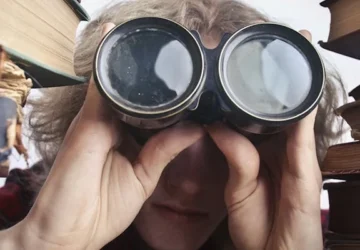
How Fiction Can Support Learning and Imagination
For centuries, a persistent myth has haunted our perception of reading. It is the myth of the “serious” versus the “frivolous.”
In this binary, non-fiction is the “serious” stuff. It is the realm of facts, history, science, and learning. Fiction, on the other hand, is cast as the “frivolous” sibling. It is entertainment. It is escapism. It is “just stories.”
This distinction is not just simplistic; it is profoundly wrong. It misunderstands the very nature of how the human brain learns and grows.
Fiction is not an escape from reality. It is a powerful simulation of reality. It is one of the most sophisticated cognitive and emotional tools humanity has ever developed. Far from being “frivolous,” reading fiction is a rigorous workout for the mind, actively building the skills necessary for critical thinking, emotional intelligence, and the very act of imagination itself.
This article explores the science behind how fiction supports learning and imagination. It argues that engaging with “stories” is not a break from learning; it is one of its most essential forms.

The Cognitive Gymnasium: Fiction as Brain Training
Our brains did not evolve to read spreadsheets. They evolved to understand narratives. Stories are the fundamental unit through which we make sense of the world, predict the future, and understand cause and effect. Fiction leverages this innate human predisposition and turns it into a powerful cognitive training tool.
A. Training for Complexity and Ambiguity:
Non-fiction often aims for clarity. It presents facts and arguments in a linear, logical fashion. Fiction, particularly literary fiction, thrives on ambiguity.
Life is rarely simple. Situations are complex. People’s motivations are murky. Information is incomplete. Fiction trains us to navigate this messiness.
-
Unreliable Narrators: When we read a story told by someone we cannot fully trust (like Humbert Humbert in “Lolita” or the narrator in “The Turn of the Screw”), our brains go into overdrive. We are forced to constantly question, to weigh evidence, to look for contradictions, and to construct our own interpretation of events. This is high-level critical thinking in action.
-
Complex Characters: Fictional characters are often contradictory. They act against their own interests. They say one thing and do another. Understanding why requires us to move beyond simple “good vs. bad” binaries and engage in complex psychological reasoning.
-
Ambiguous Endings: Many great novels do not tie everything up neatly. They leave questions unanswered. This forces the reader to continue the “cognitive work” long after the book is closed, pondering possibilities and constructing potential meanings.
This constant engagement with ambiguity is precisely the kind of thinking required to solve complex, real-world problems—problems that rarely have a single, easy answer. Fiction is a “safe space” to practice grappling with uncertainty.
B. Building Mental Models (“Schemas”):
Cognitive science tells us that we understand the world by building “schemas,” or mental models. These are frameworks of knowledge about how things work (e.g., how a restaurant operates, what happens at a job interview).
Fiction is a powerful engine for building and refining these schemas. When we read a novel set in a different time period, a different culture, or a different profession, our brain is actively constructing a mental model of that world. We are learning its rules, its social dynamics, its physics.
This is not just about “learning facts.” It is about building a richer, more flexible internal library of “how the world works.” A reader who has vicariously experienced life as a 19th-century detective, a medieval peasant, or a space explorer has a wider range of mental models to draw upon when encountering new situations in their own life. They become better at pattern recognition and analogical thinking because they have a larger “database” of human experience to compare against.

The Empathy Engine: Fiction and Theory of Mind
Perhaps the most profound way fiction supports learning is in the realm of emotional intelligence. Reading fiction is arguably the single best way to develop “Theory of Mind” (ToM) the ability to understand that other people have minds, beliefs, intentions, and emotions different from our own.
As we discussed in our article “Does Reading Make You Smarter?”, groundbreaking research by psychologists like David Comer Kidd and Emanuele Castano demonstrated that reading literary fiction (as opposed to genre fiction or non-fiction) measurably improves a person’s ability to “read” the emotions and intentions of others in real life.
How does this work?
A. Simulating Social Worlds:
Fiction is a “simulation of social worlds.” When we read a novel, we are not passive observers. Our brains actively simulate the experiences of the characters. We feel their fear, their joy, their confusion.
But more importantly, literary fiction rarely tells us what a character is thinking or feeling. Instead, it shows us through their actions, their dialogue (and what they don’t say), their small gestures.
The reader is forced to become a detective. We must constantly infer the characters’ inner states based on incomplete external evidence. “Why did she look away when he said that?” “What is he really thinking when he smiles?”
This constant act of inference is exactly what we do in real life when we try to understand the people around us. Reading fiction is, therefore, a form of social practice. Our brains run thousands of these “social simulations,” making us more adept at navigating the complexities of human interaction.
B. Experiencing Diverse Perspectives:
Fiction is a unique portal into other lives. It allows us to step, for a time, into the shoes of someone radically different from ourselves—someone of a different gender, race, class, culture, or historical period.
This is more than just “learning about” other people (which non-fiction can also do). It is about vicariously experiencing the world from their point of view. We see their struggles, understand their motivations, and feel their dilemmas as if they were our own.
This “embodied simulation” is crucial for breaking down stereotypes and building genuine empathy. It moves us beyond abstract “tolerance” and towards a felt understanding of diverse human experiences. A reader who has “lived” inside the mind of a character facing prejudice, poverty, or profound loss is fundamentally changed by that experience. Their capacity for empathy is expanded.

The Imagination Incubator: Fueling Creativity
Finally, we arrive at the most obvious, yet perhaps least understood, benefit: fiction and imagination.
Imagination is not just “daydreaming.” It is the core cognitive skill that allows us to envision possibilities, to create new ideas, to solve problems innovatively, and to plan for the future. It is the engine of all human progress.
And fiction is its primary fuel.
A. World-Building as Mental Exercise:
When you read a novel, especially fantasy or science fiction, you are not just passively receiving information about a fictional world. Your brain is actively constructing that world.
The author gives you fragments a description of a room, a line of dialogue, a hint of a strange custom. Your imagination takes those fragments and builds the rest. You visualize the castle. You hear the character’s voice. You fill in the gaps.
This act of “co-creation” between reader and writer is a powerful workout for the imaginative faculty. You are practicing the skill of building complex, coherent worlds in your mind based on limited information. This is the same skill required for designing a building, writing code, formulating a scientific hypothesis, or starting a business.
B. Thinking in Possibilities (“What If?”):
Fiction, by its very nature, is an exploration of the “What If?” Science fiction asks, “What if we could travel faster than light?” Fantasy asks, “What if magic were real?” Realistic fiction asks, “What if this person made this choice instead of that one?”
Engaging with fiction constantly primes our brains to think counter-factually to imagine realities different from our own. It loosens the grip of the “actual” and opens up the vast space of the “possible.”
This ability to envision alternatives is the bedrock of creativity and innovation. Every invention, every scientific breakthrough, every social movement begins with someone imagining a world that does not yet exist. Fiction is the playground where we practice that essential human skill.
More Than “Just Stories”
Fiction is not a distraction from learning. It is learning in its most human, engaging, and holistic form.
It is a cognitive gymnasium that trains our minds to handle ambiguity and complexity. It is an empathy engine that allows us to simulate social worlds and connect with diverse human experiences. It is an imagination incubator that fuels our ability to envision new possibilities and create the future.
In an age often criticized for its shallowness and lack of empathy, the act of reading fiction of slowing down, of immersing ourselves in another consciousness, of grappling with complex human truths is not frivolous. It is essential.
It is how we learn not just about the world, but how we learn to be in the world.
Recommended for you

What Hobby to Start: Finding Joy in Your Free Time
You don’t need a makeover to feel more alive—you need a habit you look forward to. Two hours a week sketching city corners, a dawn loop around the park, or a Sunday bake that feeds three lunches can shift your mood, your energy, and your calendar. The question behind “What Hobby to Start: Finding Joy […]

What Is Close Reading and Why It Matters in Modern Education
We are drowning in words. We read more today than at any other point in human history. We scroll through articles. We skim headlines. We digest hot takes, social media posts, and endless comment threads. Our brains, rewired by the digital age, have become incredibly efficient at one specific skill. Skimming. We have trained ourselves […]

Why Poetry Is Gaining Popularity Among Young Readers
There is a paradox in the modern literary world. For decades, the narrative has been consistent: literacy is in decline, attention spans are nonexistent, and young people, in particular, do not read. Book sales are stagnant. The novel is fighting for its life against Netflix and TikTok. And yet, in the middle of this supposed […]

How to Choose a Horror / Gothic Book: A Reader’s Guide
Stop judging a book by its cover. This is true for all literature, but it is an iron law for horror. A bloody axe, a screaming face, a shadowy figure on the cover these things rarely signal a truly terrifying book. More often, they signal a cheap thrill. The real masterpieces of the genre, the […]

Why Classic Literature Remains Relevant
Why do we still read them? This is a question that echoes through classrooms and book clubs. Why do we bother with books written 50, 100, or 200 years ago, by authors who are long dead? The world has changed. We have the internet. We have immediate, global communication. We have new problems, new technologies, […]

Travel Through Pages: Literature for Explorers
What defines “literature for explorers”? The easy answer is a story about a journey. A book that moves, that chronicles a voyage from a safe harbor to a wild, unknown land. We think of travelogues, memoirs, or survival stories. But this definition is incomplete. It’s too literal. A true story for explorers is not just […]

Best Biographies of Influential Figures
What makes a biography “great”? The simple answer is “accuracy.” A good biography, we assume, is one that gets all the facts right. It has the correct dates, the verified quotes, the detailed footnotes. This answer is true, but it is incomplete. It is the answer for a historian, not a reader. A simple collection […]

Top Modern Novels Worth Reading
What makes a novel “modern”? The word itself is a trap. Does “modern” mean new? Does it mean it was written in our lifetime? Or does it refer to a specific, explosive period in art (capital ‘M’ Modernism) that shattered every rule it could find? We believe it’s all three. The “modern novel” isn’t just […]